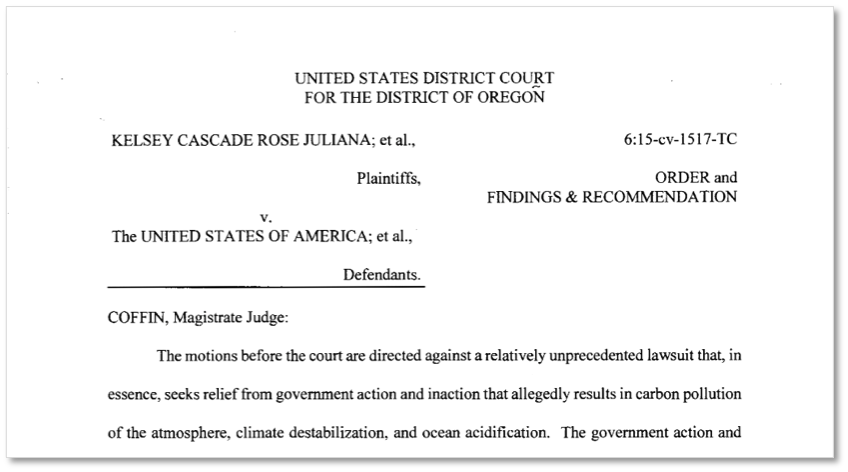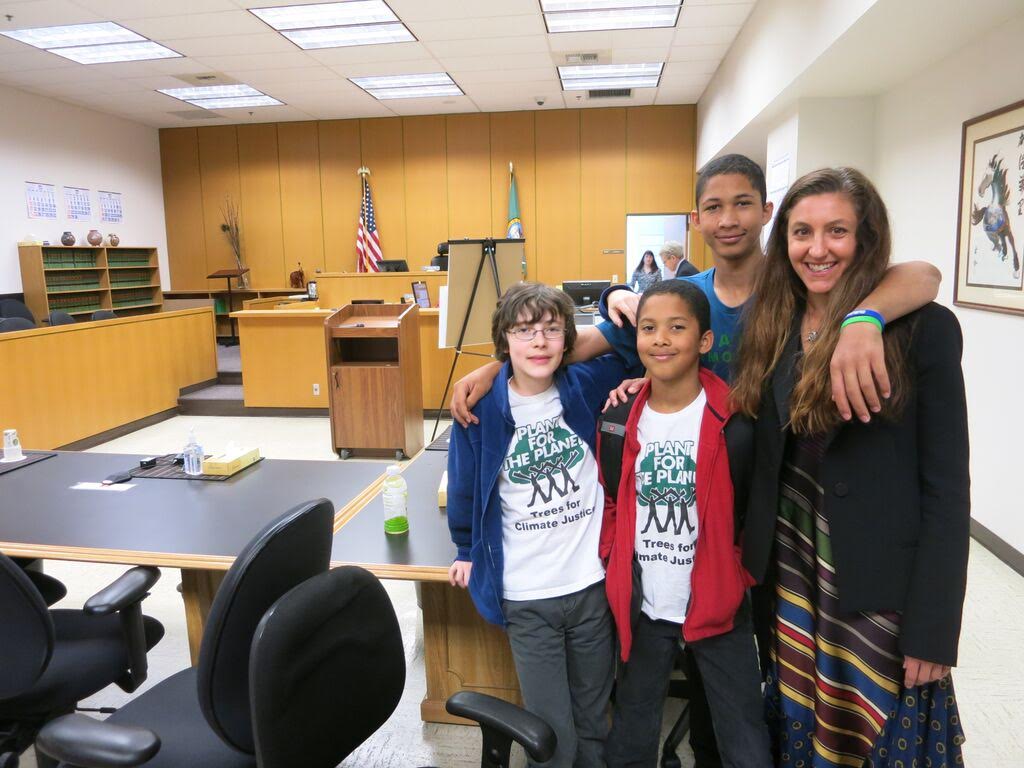Each month, Arnold & Porter and the Sabin Center for Climate Change Law collect and summarize developments in climate-related litigation, which we also add to our U.S. and non-U.S. climate litigation charts. If you know of any cases we have missed, please email us at columbiaclimate at gmail dot com.
Here are the latest additions to the Climate Case Chart
Update #73 (April 8, 2015)
FEATURED DECISION
Massachusetts Court Rebuffed Challenge to Adequacy of State’s Greenhouse Gas Reduction Measures
A Massachusetts Superior Court ruled that the Massachusetts Department of Environmental Protection (MassDEP) had substantially satisfied the requirements of the Global Warming Solutions Act, a 2008 law that required MassDEP to “promulgate regulations establishing a desired level of declining annual aggregate emission limits for sources or categories of sources that emit greenhouse gas emissions.” MassDEP argued that it had satisfied this mandate by developing three programs: limitations on sulfur hexafluoride leaks, participation in a regional cap-and-trade program for carbon dioxide emissions, and a Low Emission Vehicle program. The court found that each of these programs satisfied the statutory mandate, and said that the plaintiffs’ “various quarrels” with the regulatory actions were “hypertechnical and overly exacting.” One of the plaintiffs, Conservation Law Foundation, announced on March 25, 2015 that it would appeal the decision. Kain v. Massachusetts Department of Environmental Protection, No. SUCV2014-02551 (Mass. Super. Ct. Mar. 23, 2015): added to the “Force Government to Act/Other Statutes” slide.
DECISIONS AND SETTLEMENTS
Federal Court Rejected EPA Defense That Coal Companies Lacked Standing to Bring Jobs Case
The federal district court for the Northern District of West Virginia ruled that coal companies had standing to claim that the U.S. Environmental Protection Agency (EPA) had failed to fulfill its nondiscretionary obligation to conduct evaluations of potential losses or shifts in employment due to the administration and enforcement of the Clean Air Act. The court said that the alleged injuries from the power industry’s discontinuance of the use of coal were fairly traceable to EPA actions, including EPA’s failure to conduct the employment evaluations. The court further found that such injuries would be redressable because conducting the evaluations could result in reversal of prior EPA actions. The court also found that the coal companies fell within the zone of interests protected by the Clean Air Act provision requiring the evaluations. In addition, the court held that the companies had procedural and informational standing. Murray Energy Corp. v. McCarthy, No. 5:14-CV-39 (N.D. W. Va. Mar. 27, 2015): added to the “Challenges to Federal Action” slide.
Arizona Court Upheld Decision to Withhold Emails of University of Arizona Climate Scientists
The Arizona Superior Court in Pima County ruled that the Arizona Board of Regents did not act arbitrarily and capriciously when it denied access to more than 1,700 emails of two University of Arizona climate scientists. The emails were among documents requested by the Energy & Environmental Legal Institute pursuant to Arizona’s public records law. Based on a representative set of 90 emails, the court concluded that the Board of Regents had properly withheld prepublication critical analysis, unpublished data, analysis, research, results, drafts, and commentary on the ground that production of these emails “would have a chilling effect on the ability and likelihood of professors and scientists engaging in frank exchanges of ideas and information.” The court noted that the Board of Regents had provided “compelling” support of this position through the affidavits of scholars, academic administrators, and professors. Energy & Environment Legal Institute v. Arizona Board of Regents, No. C20134963 (Ariz. Super. Ct. Mar. 24, 2015): added to the “Climate Change Protesters and Scientists” slide.
Court Granted Request for Extradition of Man Allegedly Involved in Fraudulent Trading of Greenhouse Gas Emissions Allowances in Germany
A magistrate judge in the federal district court for the Northern District of California granted the U.S. government’s request for a certificate of extraditability in the case of a man charged in Germany with 89 counts of tax evasion. The charges in Germany include allegations of fraud in connection with the trade of greenhouse gas emissions allowances. In re Azizi, No. 5:14-XR-90282 (N.D. Cal. Mar. 20, 2015): added to the “Regulate Private Conduct” slide.
Federal Court Denied New Hampshire Power Plant Operator’s Request to Intervene in Citizen Suit
The federal district court for the District of Columbia denied a power plant operator’s motion to intervene in a citizen suit in which Sierra Club sued EPA for failing to respond to its petition concerning the operator’s plant. Sierra Club asked EPA to object to a proposed permit for the plant, which is located in Portsmouth, New Hampshire, and sued when EPA did not respond to the petition. EPA and Sierra Club had reached a tentative agreement to settle the lawsuit; the power plant operator sought to intervene, arguing that otherwise its interests would not be adequately represented. The court concluded that the operator was not entitled to intervene as of right because Sierra Club’s lawsuit involved only the timing of EPA’s response and not the validity or terms of the operator’s permit. The court also declined to grant permissive intervention because the parties had already reached a tentative settlement with which the operator’s intervention could interfere. Sierra Club v. McCarthy, No. 1:14-cv-2149 (D.D.C. Mar. 17, 2015): added to the “Challenges to Coal-Fired Power Plants” slide.
Massachusetts Court Dismissed Harvard Students’ Divestment Lawsuit
The Massachusetts Superior Court dismissed an action in which Harvard students asked the court to compel Harvard University to divest from fossil fuel companies. The court ruled that the individual students did not have standing to claim mismanagement of charitable assets based on their status as students because their rights as students were “widely shared” with thousands of other Harvard students and were not “specific” and “personal” enough to endow them with standing. The court also rejected the students’ argument that Harvard’s investment in fossil fuels interfered with personal rights because it diminished their education in fields such as environmental law and because Harvard’s funding of “climate change denial” chilled academic freedom and impeded the students’ association with “like-minded colleagues.” The court noted that these impacts were not “personal” to the plaintiffs since numerous other students would be affected. The court also found that the allegations were too speculative and conclusory. The court also dismissed the claim of “intentional investment in abnormally dangerous activities.” The court said that it was not its place either to recognize this proposed new tort action or to extend existing law on standing to permit the plaintiffs to litigate on behalf of “Future Generations,” as they sought to do. The court also said that an “overarching” problem with the action was the absence of limitations on the subject matter and scope of this type of lawsuit. The court noted that while the student plaintiffs “fervently believe” that climate change poses the most serious threat to the world, other students would just as fervently believe that some other cause posed a serious threat. Harvard Climate Justice Coalition v. President and Fellows of Harvard College (“Harvard Corporation”), No. 2014-3620-H (Mass. Super. Ct. Mar. 17, 2015): added to the “Regulate Private Conduct” slide.
New Mexico Appellate Court Said Judiciary Could Not Rely on Public Trust Doctrine to Compel Regulation of Greenhouse Gases
The New Mexico Court of Appeals ruled that courts could not require the state to regulate greenhouse gas emissions based on a common law duty arising from the public trust doctrine. The ruling affirmed a 2013 trial court decision granting summary judgment to the state in a case brought by WildEarth Guardians and parents on behalf of their minor child. The appellate court concluded that although the New Mexico constitution recognized a public trust obligation to protect natural resources, including the atmosphere, the obligation had been incorporated into and implemented by state constitutional and statutory provisions, including New Mexico’s Air Quality Control Act. Therefore, the plaintiffs could not use a separate common law cause of action to make their arguments regarding the state’s duty to protect the atmosphere. The appellate court noted that the plaintiffs had not appealed the New Mexico Environmental Improvement Board’s repeal of restrictions on greenhouse gas emissions; nor had the plaintiffs proposed other greenhouse gas regulations pursuant to Air Quality Control Act. Sanders-Reed v. Martinez, No. 33,110 (N.M. Ct. App. Mar. 12, 2015): added to the “Common Law Claims” slide.
California Supreme Court Agreed to Consider Whether CEQA Required Review of Consistency with 2005 Executive Order’s Greenhouse Gas Emissions Targets
The California Supreme Court granted the San Diego Association of Governments’ (SANDAG’s) petition for review of an appellate court decision that found that SANDAG’s environmental review for its regional transportation plan was inadequate. In November 2014, the California Court of Appeal said that the review should have considered the plan’s consistency with greenhouse gas emissions targets set in a 2005 executive order signed by Governor Arnold Schwarzenegger. The Supreme Court granted review only on the issue of whether compliance with the California Environmental Quality Act (CEQA) required an analysis of the regional transportation plan’s consistency with the executive order’s goals. Cleveland National Forest Foundation v. San Diego Association of Governments, No. S223603 (Cal. Mar. 11, 2015): added to the “State NEPAs” slide.
California Supreme Court Denied Review of Decision Setting Aside San Diego County’s Climate Action Plan
The California Supreme Court denied a petition for review of a lower appellate court decision that set aside San Diego County’s approval of a climate action plan. The lower appellate court said that the climate action plan required preparation of a supplemental environmental impact report, and that the plan should have included enforceable mitigation measures. Sierra Club v. County of San Diego, No. S223591 (Cal. Mar. 11, 2015): added to the “State NEPAs” slide.
Though Critical of EPA FOIA Practices, Federal Court Declined to Impose Punitive Sanctions
The federal district court for the District of Columbia denied the request of the Landmark Legal Foundation (LLF) for punitive spoliation sanctions against EPA in a lawsuit brought to compel production of documents under the Freedom of Information Act (FOIA). LLF believed records it requested in August 2012 would reveal that EPA improperly delayed controversial environmental regulations prior to that year’s presidential election. In 2013, the court allowed limited discovery after finding that LLF had raised questions of fact regarding whether certain records, including potentially relevant personal emails for certain EPA officials, had been excluded from EPA’s records search. A year later, LLF sought sanctions, arguing that EPA had failed to search and recover relevant personal emails and text messages. In denying the sanctions motion, the court found that LLF had not presented sufficient evidence that EPA failed to preserve responsive documents in bad faith. The court, however, criticized EPA’s response to the FOIA request, finding that some of the document searches could only have been done with “abject carelessness” and that an EPA employee had exhibited “utter indifference” to the agency’s FOIA obligations. The court was also critical of EPA’s “baffling” refusal to take responsibility for its mistakes during the course of the litigation. Nonetheless, the court said that spoliation could not be inferred from EPA’s delayed response, and that negligent failure to preserve records was not sufficient to warrant punitive sanctions. The court said, however, that it “would implore” the executive branch to take steps to ensure that all EPA FOIA requests are “treated with equal respect and conscientiousness” regardless of the requester’s political affiliation. Landmark Legal Foundation v. Environmental Protection Agency, No. 1:12-cv-01726 (D.D.C. Mar. 2, 2015): added to the “Force Government to Act/Other Statutes” slide.
Federal Court Dismissed Steel Company’s Clean Air Act Citizen Suit Against Rival Company
The federal district court for the Eastern District of Arkansas dismissed a Clean Air Act citizen suit brought against a steel company by a rival steel company concerning a Prevention of Significant Deterioration permit issued by the Arkansas Department of Environmental Quality. The plaintiff’s allegations included that the defendant had failed to satisfy Best Available Control Technology (BACT) requirements, including by conducting an improper greenhouse gas BACT analysis and by improperly eliminating carbon capture and sequestration as a control technology. The court dismissed the action as an impermissible collateral attack on a state-issued air permit. Nucor Steel-Arkansas v. Big River Steel, LLC, No. 3:14-CV-00193 (E.D. Ark. Feb. 25, 2015): added to the “Regulate Private Conduct” slide.
NEW CASES, MOTIONS, AND NOTICES
Competitive Enterprise Institute Sought EPA Correspondence Regarding Congressional Inquiries into Climate Research Funding
The Competitive Enterprise Institute (CEI) filed a lawsuit against EPA to compel production of correspondence between EPA and four federal legislators concerning inquiries that the legislators had made regarding funding for climate research. CEI submitted its Freedom of Information Act requests to EPA in late February and early March 2015. The legislators whose correspondence is the subject of the requests are three senators who had sent letters to fossil fuel companies and trade associations seeking information about their funding of climate research and advocacy and a congressman who asked universities to provide information about climate researchers they employed. Competitive Enterprise Institute v. United States Environmental Protection Agency, No. 1:15-cv-00466 (D.D.C., filed Apr. 1, 2015): added to the “Climate Protesters and Scientists” slide.
Challenge to Renewal Fuel Standard Delays Was Filed in District of Columbia Federal Court
American Fuel & Petrochemical Manufacturers (AFPM) and American Petroleum Institute (API) filed an action in the federal district court for the District of Columbia to compel EPA to establish renewable fuel volume requirements for the 2014 and 2015 compliance years. The trade associations asserted that EPA had ignored its nondiscretionary duty to publish annual renewable fuel volumes and renewable fuel obligations by November 30 of the year preceding each compliance year. The trade associations also alleged that EPA had failed to respond to the organizations’ 2013 request for a partial waiver of the applicable renewable fuel volumes for 2014, which are established by the Clean Air Act. AFPM and API filed notices of their intent to file the lawsuit in November and December 2014. EPA announced in the Federal Register on December 9, 2014 that it would not finalize the 2014 standards until sometime in 2015; EPA has not yet proposed 2015 standards. American Fuel & Petrochemical Manufacturers v. McCarthy, No. 1:15-cv-00394 (D.D.C., filed Mar. 18, 2015): added to the “Challenges to Federal Action” slide.
Trade Associations Challenged Constitutionality of Oregon Clean Fuels Program
Three trade associations—American Fuel & Petrochemical Manufacturers, American Trucking Association, and Consumer Energy Alliance—filed a lawsuit in federal court in Oregon to enjoin the state’s Clean Fuels Program. The plaintiffs claimed that the program, which requires reductions in the carbon intensity of fuels produced in or imported into the state, violates the U.S. Constitution’s Commerce Clause because it discriminates against transportation fuels imported into Oregon and attempts to regulate economic activities such as extraction, production, and distribution of transportation fuels that occur outside Oregon’s borders. The plaintiffs contended that the regulation of economic conduct outside the state also violates “principles of interstate federalism embodied in the federal structure of the United States Constitution.” The three organizations also claimed that the Clean Fuels Program violates the Supremacy Clause because it is preempted by federal laws, including the Clean Air Act, the Energy Policy Act of 2005, the Energy Independence and Security Act of 2007, and the federal Renewable Fuels Standard. American Fuel & Petrochemical Manufacturers v. O’Keeffe, No. 3:15-cv-00467 (D. Or., filed Mar. 23, 2015): added to the “Challenges to State Action” slide.
Trade Association Challenged Oregon Regulations for Clean Fuels Program
The Western States Petroleum Association (WSPA) filed a petition for judicial review in the Oregon Court of Appeals to challenge regulations adopted in January 2015 to implement Oregon’s Clean Fuels Program. WSPA indicated in a press release that sufficient alternative fuels would not be available to meet the regulations’ requirements. Western States Petroleum Association v. Oregon Commission on Environmental Quality, No. A158944 (Or. Ct. App., filed Mar. 6, 2015): added to the “Challenges to State Action” slide.
CEQA Lawsuit Challenged Refining Facility Project and Alleged Undisclosed Impacts from Increased Transportation and Refining of Low-Quality Oil Feedstocks
Communities for a Better Environment (CBE) filed a lawsuit in California Superior Court alleging that Contra Costa County failed to comply with the California Environmental Quality Act when it approved a project to allow Phillips 66 to modify and augment an existing facility to recover additional butane and propane. CBE contended that the environmental impact report (EIR) prepared for the project obscured the increase in refining of lower-quality oil feedstocks that would occur as a result of the project. CBE alleged that the EIR therefore did not adequately disclose impacts that would occur as a result of the transportation and refining of the lower-quality feedstocks, including, among other impacts, increased emissions of greenhouse gases. Communities for a Better Environment v. Contra Costa County, No. N15-0301 (Cal. Super. Ct., filed Mar. 4, 2015): added to the “State NEPAs” slide.
Environmental Organizations Challenged Port of Seattle Lease for Shell Arctic Drilling Fleet
Four environmental organizations filed a lawsuit against the Port of Seattle alleging that it had improperly entered into a lease pursuant to which it would serve as a homeport for Royal Dutch Shell’s Arctic drilling fleet. The organizations claimed that the Port had illegally circumvented the State Environmental Policy Act and had therefore avoided a full assessment of the project’s environmental impacts. The organizations also contended that the Port was required to obtain a revision of its substantial shoreline development permit prior to entering into the lease. Puget Soundkeeper Alliance v. Port of Seattle, No. 15-2-05143-1 SEA (Wash. Super. Ct., filed Mar. 2, 2015): added to the “State NEPAs” slide.




